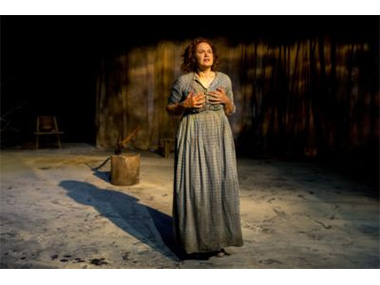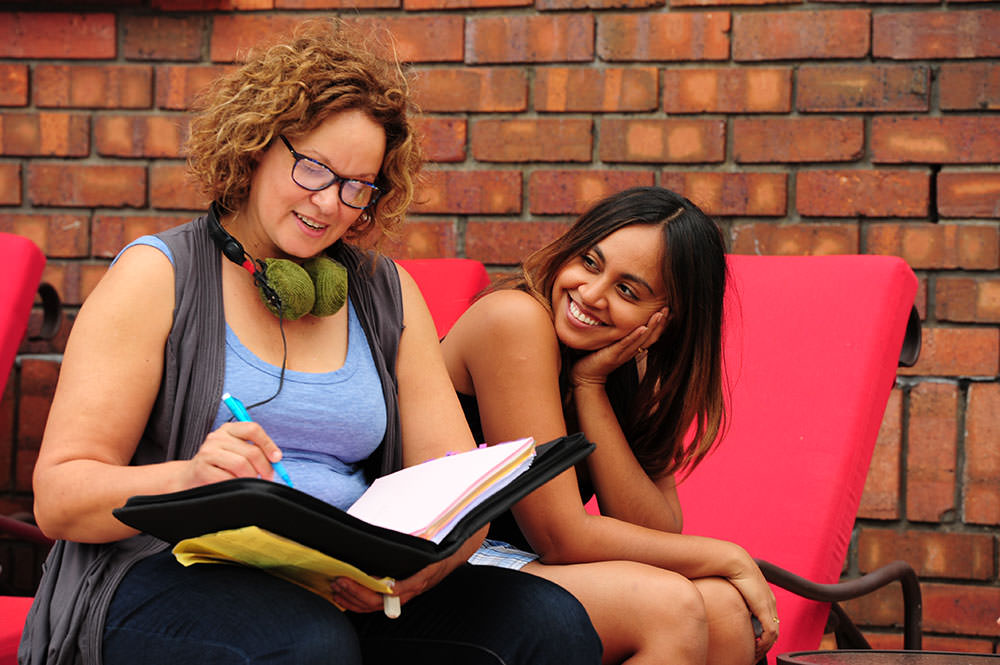Leah Purcell Wins Prize for Playwriting & Book of the Year

Leah Purcell as The Drover's Wife, which she also wrote.
Aboriginal Art Directory | 23.05.17
News source: Research / AAD
Leah Purcell has been awarded the Nick Enright Prize for Playwrighting ($30,000) in the NSW Premier's Literary Awards, and also the Book of the Year ($10,000), for The Drover's Wife.
It's hoped that the play (which ran at Sydney's Belvoir Theatre last year and in which the multi-talented Purcell also starred) will tour nationally and internationally. A film-script is also being developed.
Jeremy Eccles wrote a review of The Drover's Wife during the Belvoir run - which we're re-publishing here.
Last year Purcell also directed the Channel 7 series, The Secret Daughter, starring Jessica Mauboy. Filming for the second series is currently underway.
Waiting for Alligator (Jeremy Eccles Review)
A play less like Samuel Beckett's could hardly be imagined. But like 'Godot', we do spend a good part of 'The Drover's Wife' waiting for, but never meeting Alligator, the legendary dog in the Henry Lawson story that gave Leah Purcell's play its title. We even get the Lawson story told by Purcell – also playing the lead, Molly, the drover's wife – all done and dusted in a minute and bowdlerised in order to transform the heroism of both wife and dog in the original into a morality against the cheating ways of itinerant Aboriginal labour.
For Molly is unburdening herself of all her instinctive 1893 prejudices against Yadaka (whom she insists on simply calling Black), offering himself to her as itinerant Aboriginal labour. And is he itinerant! Yadaka claims to be of Guugu Yimithirr stock (sometimes called Koko Imudji) from eastern Cape York, who'd run away with a circus, been dumped in Melbourne, been taken in and educated by a priest and latterly adopted by the local Ngambri Walgulu tribe whose Country stretched from Canberra south through the Snowies, where Molly awaits her Drover husband's return, almost as far as Mt Jagungal.
There's violence in the district (and on stage) – another lonely drover's wife and family have been murdered - and Yadaka may be responsible. Certainly the troopers have arrested him on a suspicion that will almost certainly end in his death, and he's escaped. Yet the arrival of more itinerants – all white and offering only an utterly malign version of mateship; clearly more evil than Yadaka – tests the odd couple's slowly growing loyalty to each other. For Yadaka has proved his morality to Molly's teenage boy, Danny by chiding him for his lack of respect for his absent Dad. Despite her omnipresent rifle, it surely helps the development of such an unlikely bond that he's the only person around when her waters break and a still-born daughter is delivered.
Birth, death and dramatic story-telling, rape, a worryingly sharp axe and a lynching, all on or just off-stage, suggest that Leah Purcell had in mind the plays of the era that she's set her drama in. For the word melodrama springs to mind. Such plays “exploited pure whites and seamy blacks of character, inviting sighs and hisses, unashamed laughter and tears, all within a few minutes”, according to Leslie Rees's 'The Making of Australian Drama – Volume 1', and were penned by such names as Edward Geoghegan, Walter Cooper and Alfred Dampier.
Highly ironic that use of the phrase, “pure whites and seamy blacks”! For Purcell's purpose is an Indigenising of that once-white tradition of story-telling. But not with the absolutes of Blak art, more the subtleties of a Peter Sculthorpe composition taking Aboriginal melodies and letting them flow into and out of his Western musical practice. Hints of our destination come as Danny eagerly adapts to spear-throwing and accepts that he may be initiated; and the revelation that Molly has, in the past accepted the midwifing skills of Ginny May, whom Yadaka identifies as a Walgulu healer, just as the Drover's Wife did in the original Lawson. But the first suggestion that Molly's own mother – who died in childbirth – may have been Aboriginal is absolute anathema to her.
As with a good detective story, I won't reveal more. It's enough to say that the point at which Molly is lying, shattered, like a rag doll against her chopping block, poetically extolling the special beauty of the Snowgum, brokenly singing again the song 'Black is the Colour of my True Love's Hair' which she's also sung as her stillborn daughter's obsequy, and repeatedly intoning the fateful word “Black”, is indeed shattering for all of us.
The dominance of Leah Purcell as writer and star tends to deny the importance of director Leticia Caceres in bringing this delicate dramatic and racial balancing act off. Purcell's uncomfortable journey on stage is greatly assisted by Mark Coles Smith (the troubled young Aborigine in 'Last Cab to Darwin') as Yadaka, and Will McDonald as Danny – though I do wish he'd been allowed to utter the Henry Lawson line in full: “I won't never go droving, blarst me if I do”! On the other hand, the Wife's journey is probably not that helped by the excessively Celtic accents of the show's baddies, on top of the vernacular text written for them by Purcell in the first place.
And Stephen Curtis's barebone set with a stunning Snowgum branch as an essential plot and visual prop lacked only one thing in its employment. The sandy floor on which much of the action was imprinted, then left to bear witness as it was insufficiently swept away, could also have been tellingly used to illustrate the inherently Indigenous episodes of story-telling in this gripping play.
URL: http://www.sl.nsw.gov.au/about-library-awards/nsw-premiers-literary-awards
Share this:
»  del.icio.us
»
del.icio.us
»  Digg it
»
Digg it
»  reddit
»
reddit
»  Google
»
Google
»  StumbleUpon
»
StumbleUpon
»  Technorati
»
Technorati
»  Facebook
Facebook
Contact Details

Leah Purcell and Jessica Mauboy on the set of The Secret Daughter (Photo: Screen Australia)
Further Research
News Archive
- 10.10.18 | The Aboriginal Memorial – A Smouldering Reproach
- 03.10.18 | Closing the Craft Circle
- 25.09.18 | OCEANS APART
- 13.09.18 | SYDNEY CONTEMPORARY 2018
- 11.09.18 | Alice Springs Gallery Project – Mixed Views
- 05.09.18 | The Museum Race Hots Up
- 03.09.18 | Mawurndjul Makes Headlines in DC
- 24.08.18 | Whispering Still
- 23.08.18 | Indigenous Pots Are Hot
- 19.08.18 | CIAF Sets Records
- 17.08.18 | SCHIZOPHRENIA OF THE COLONISED
- 16.08.18 | The Politics of Art in Darwin
- 01.08.18 | A SENSE OF PLACE
- 30.07.18 | The Long Forgotten Dream
- 29.06.18 | INTERNATIONAL ACTIVITY
Advertising

